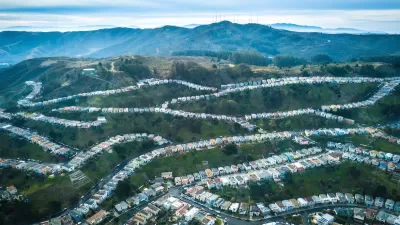While there's no consensus on the precise number of white-collar jobs American companies will outsource to India in the coming years, it seems increasingly clear that millions of middle class jobs -- from programmers and back-office technicians to Wall Street analysts and architects -- will soon find their way from U.S. office parks to the cubicles of Bangalore and Mumbai.
 And while we swap stories about out-of-work programmers, one thing is clear: no one is preparing for the most important challenge -- ensuring that America's suburbs are ready for the inevitable and painful transition.
And while we swap stories about out-of-work programmers, one thing is clear: no one is preparing for the most important challenge -- ensuring that America's suburbs are ready for the inevitable and painful transition.
Why America's suburbs? In short, because America's high tech suburbs -- where millions of "information economy" jobs have been created in the past few decades -- are most at risk. In Silicon Valley's Santa Clara County, unemployment is still above the national average. In suburban Denver, Colorado, telecom companies have shed thousands of jobs. Cutting edge places like suburban northern Virginia, Route 128, outside of Boston, and Research Triangle Park, North Carolina should all be worried.
So will these leafy suburbs and corporate campuses turn into 21 st century versions of decaying Flint, Michigan? It's too soon to tell, but as America's older cities know well, it's hard to dodge the bullet of inexorable economic change.
In the 1960s and 1970s, as the first wave of manufacturing jobs left the U.S. for China and other low-cost locations, hundreds of thousands of American factory workers received pink slips. While factory workers were hard hit by these wrenching changes in the economy, it was America's manufacturing cities -- like New York, Detroit, Baltimore, and Philadelphia -- that really hit the skids. Workers could leave for greener pastures and other jobs, but cities could only do their best to staunch the bleeding. The loss of these jobs sent many cities into tailspins from which they are only now -- 30 years later -- beginning to recover.
If America's suburbs take a lesson from the recent experiences of its cities, however, they just might have a chance. First, start planning now for slower growth. While they might eventually be replaced, those jobs won't be coming back. Second, compete for new high-value industries like nanotechnology and biotech. Third, encourage the development of arts and cultural amenities that might persuade existing residents to stay put.
With some luck, America's suburbs will weather this global economic storm. And if not, well--suburban Bangalore is supposed to be very nice.
Seth Brown is publisher of The Next American City, a quarterly magazine about the ongoing transformation of America's communities. Excerpts of The Next American City's current issue -- looking at competition between cities -- are available on the web at www.americancity.org.

Depopulation Patterns Get Weird
A recent ranking of “declining” cities heavily features some of the most expensive cities in the country — including New York City and a half-dozen in the San Francisco Bay Area.

Pennsylvania Mall Conversion Bill Passes House
If passed, the bill would promote the adaptive reuse of defunct commercial buildings.

California Exodus: Population Drops Below 39 Million
Never mind the 40 million that demographers predicted the Golden State would reach by 2018. The state's population dipped below 39 million to 38.965 million last July, according to Census data released in March, the lowest since 2015.

Google Maps Introduces New Transit, EV Features
It will now be easier to find electric car charging stations and transit options.

Ohio Lawmakers Propose Incentivizing Housing Production
A proposed bill would take a carrot approach to stimulating housing production through a grant program that would reward cities that implement pro-housing policies.

Chicago Awarded $2M Reconnecting Communities Grant
Community advocates say the city’s plan may not do enough to reverse the negative impacts of a major expressway.
City of Costa Mesa
Licking County
Barrett Planning Group LLC
HUD's Office of Policy Development and Research
Mpact Transit + Community
HUD's Office of Policy Development and Research
City of Universal City TX
ULI Northwest Arkansas
Town of Zionsville
Write for Planetizen
Urban Design for Planners 1: Software Tools
This six-course series explores essential urban design concepts using open source software and equips planners with the tools they need to participate fully in the urban design process.
Planning for Universal Design
Learn the tools for implementing Universal Design in planning regulations.























